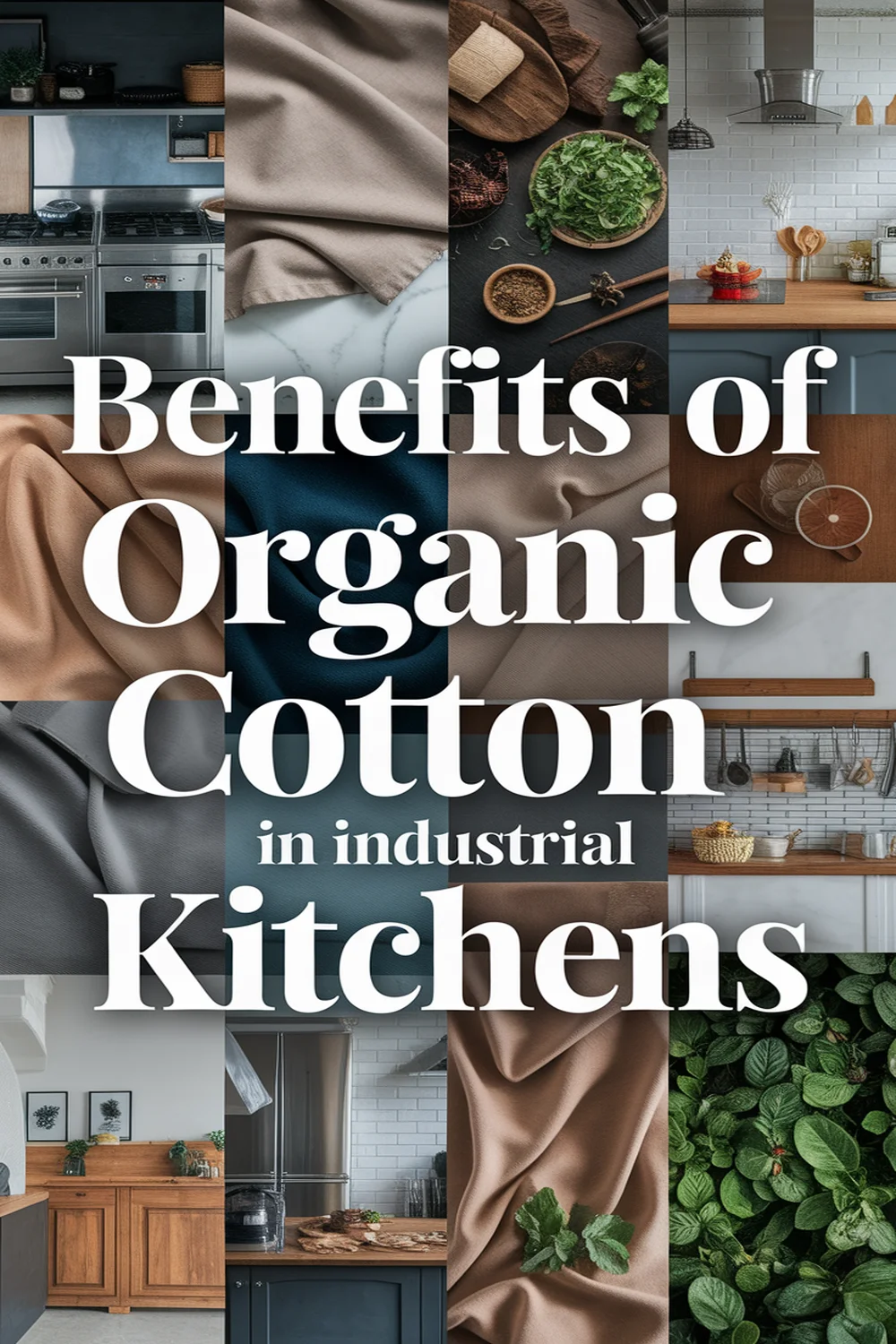This post may contain affiliate links. Please read our policy page.
Using organic cotton in industrial kitchens brings multiple benefits. It’s grown sustainably, reducing chemical usage and promoting healthier ecosystems. The fabric’s durability means it withstands tough kitchen use while remaining hypoallergenic, which is great for staff health. Plus, its excellent absorbency and aesthetic appeal enhance both functionality and atmosphere in culinary settings. With rising consumer demand for sustainable practices, choosing organic cotton can improve your kitchen’s reputation and bottom line. There’s much more to explore about this eco-friendly choice.
Understanding Organic Cotton

When I explore the world of organic cotton, I find it fascinating how this natural fiber stands apart from conventional cotton. Unlike traditional cotton, organic cotton is grown without synthetic pesticides or fertilizers, prioritizing soil health and biodiversity.
This approach not only nurtures the ecosystem but also produces a fiber free from harmful chemicals. The cultivation process respects natural growing cycles, which means organic cotton tends to be softer and more durable, making it ideal for industrial kitchens where quality and longevity matter.
Additionally, opting for organic cotton promotes ethical farming practices, supporting farmers committed to sustainable agriculture. By choosing organic cotton in your industrial kitchen, you’re investing in superior quality and making a conscious choice for both your team and the planet.
Environmental Benefits of Organic Cotton

Choosing organic cotton not only enhances the quality of textiles but also greatly benefits the environment. I’ve seen firsthand how organic farming practices minimize chemical usage, which reduces soil and water pollution.
Unlike conventional cotton, organic cotton is grown without harmful pesticides and fertilizers, promoting biodiversity and healthier ecosystems. Additionally, organic farming methods improve soil health, leading to better carbon sequestration and combating climate change.
By opting for organic cotton in industrial kitchens, we’re supporting sustainable agriculture and reducing our overall carbon footprint. It’s a powerful choice that aligns with our responsibility to protect the planet.
When we invest in organic cotton, we’re not just making a textile choice; we’re making a commitment to a healthier planet for future generations.
Health Advantages for Chefs and Kitchen Staff

While many may overlook the impact of textile choices on health, using organic cotton in industrial kitchens offers significant benefits for chefs and kitchen staff. Organic cotton is free from harmful chemicals, which means less risk of skin irritations and allergic reactions. It’s breathable and moisture-wicking, helping to keep us comfortable during long shifts. Additionally, the absence of toxic dyes guarantees a safer work environment.
| Health Benefits | Description |
|---|---|
| Chemical-Free | No harmful substances, reducing irritation. |
| Breathability | Keeps skin cool and comfortable. |
| Moisture-Wicking | Absorbs sweat, improving hygiene. |
| Non-Toxic Dyes | Safer for prolonged skin contact. |
Switching to organic cotton can lead to a healthier workplace for everyone.
Recommended Items
Here are our recommended products and equipment to install—feel free to explore!
Enhanced Durability of Organic Cotton Products

The benefits of organic cotton extend beyond health; they also encompass remarkable durability, making it an ideal choice for industrial kitchens.
Organic cotton offers exceptional durability, making it a perfect choice for the demands of industrial kitchens.
I’ve found that organic cotton products stand up to the rigors of daily use better than many alternatives. Here are a few reasons why:
- Stronger Fibers: Organic cotton fibers are denser, providing more resistance to wear and tear.
- Eco-Friendly Production: The cultivation process avoids harsh chemicals, which can weaken fibers.
- Longer Lifespan: Products made from organic cotton tend to last longer, reducing the need for frequent replacements.
- Resilience: They maintain their quality and shape, even after numerous washes.
Choosing organic cotton not only supports sustainability but also guarantees that your kitchen tools are durable and reliable for every task.
Superior Absorbency for Kitchen Tasks

When it comes to tackling spills and messes in industrial kitchens, organic cotton truly excels in absorbency. I’ve found that its natural fibers can soak up liquids more effectively than synthetic alternatives, making it an invaluable tool in a bustling kitchen environment. This high absorbency not only helps keep surfaces dry but also reduces the risk of slips and falls, enhancing safety for everyone.
Here’s a quick comparison of absorbency features:
| Feature | Organic Cotton |
|---|---|
| Liquid Retention | High |
| Drying Time | Moderate |
| Environmental Impact | Low |
| Cost-effectiveness | Competitive |
Using organic cotton for kitchen tasks means fewer spills and a cleaner workspace, ultimately improving efficiency and hygiene.
Reduced Chemical Exposure in the Kitchen

Switching to organic cotton in industrial kitchens not only enhances absorbency but also greatly reduces chemical exposure. This shift is vital for both staff health and food safety.
Here are some key benefits:
- No Harmful Pesticides: Organic cotton is grown without synthetic pesticides, minimizing toxic residues in the kitchen.
- Lower Allergens: It’s less likely to irritate sensitive skin, reducing allergic reactions among kitchen staff.
- Safer Cleaning: Using organic cotton for cleaning cloths means avoiding chemicals that can leach into food.
- Sustainability: By choosing organic, we’re supporting farming practices that prioritize human health over chemical dependency.
Making this change not only protects our team but also guarantees a safer environment for our customers.
Embracing organic cotton is a smart choice for any industrial kitchen.
Biodegradability and Eco-Friendly Disposal

Embracing organic cotton in industrial kitchens not only benefits staff health but also aligns with eco-friendly practices, especially regarding biodegradability and disposal.
Unlike conventional cotton, organic cotton is free from harmful chemicals, making it a safer choice for both workers and the environment.
When organic cotton products reach the end of their life cycle, they break down naturally, reducing landfill waste. This means you can dispose of them without the guilt that often accompanies synthetic materials.
Choosing organic cotton encourages a circular economy, where materials return to the earth, enriching the soil.
Supporting Sustainable Farming Practices

By choosing organic cotton, I support sustainable farming practices that prioritize environmental health and social responsibility. This choice helps promote a healthier planet and community.
Choosing organic cotton fosters sustainable farming, benefiting both our planet and communities.
Here are some key benefits of organic cotton farming:
- Soil Health: Organic practices enhance soil fertility and structure, reducing erosion and degradation.
- Biodiversity: These farms encourage diverse ecosystems, leading to a balance of pests and pollinators.
- Water Conservation: Organic cotton requires less water and improves water retention in soil, conserving essential resources.
- Fair Labor Practices: Many organic farms emphasize ethical labor standards, supporting workers’ rights and fair wages.
Cost-Effectiveness in the Long Run

Choosing organic cotton not only supports sustainable farming practices but also proves to be cost-effective in the long run.
At first glance, organic cotton may seem pricier than conventional options, but I’ve found that its durability considerably reduces replacement costs. These materials withstand frequent washing and heavy-duty use, making them ideal for industrial kitchens.
Additionally, organic cotton’s hypoallergenic properties lead to fewer skin irritations, potentially reducing employee health-related expenses. Investing in organic cotton also enhances a kitchen’s reputation, attracting eco-conscious customers who are willing to pay a premium for sustainable practices.
Over time, these factors contribute to substantial savings, making organic cotton a smart financial choice. Ultimately, the upfront investment pays off, ensuring both quality and cost-effectiveness.
Decor Ideas for Organic Cotton in Kitchens
Versatility of Organic Cotton Materials

Although many might associate organic cotton primarily with clothing or home textiles, its versatility extends far beyond those categories, making it an excellent choice for industrial kitchens.
I’ve found that organic cotton can adapt to various needs, enhancing both function and sustainability. Here are four key applications:
- Aprons: Durable and easy to clean, they protect staff while providing comfort.
- Dish Towels: Highly absorbent, organic cotton towels excel in drying and sanitizing.
- Oven Mitts: Insulating properties guarantee safety without sacrificing flexibility.
- Table Linens: They offer a soft, natural feel while being resistant to wear.
Aesthetic Appeal in Culinary Settings

The visual impact of organic cotton in industrial kitchens can’t be overlooked. When I walk into a culinary space adorned with organic cotton textiles, I immediately notice the warmth and inviting atmosphere they create.
The natural fibers and earthy tones lend a sense of authenticity that synthetic materials simply can’t replicate. This aesthetic appeal not only enhances the overall ambiance but also reflects a commitment to quality and sustainability.
Using organic cotton table linens, uniforms, and aprons elevates the kitchen’s style, making it more appealing to both staff and patrons. In a world increasingly focused on sustainability, the choice of organic cotton speaks volumes about a kitchen’s dedication to environmentally friendly practices, making it not just a functional choice but a visually compelling one as well.
Ethical Sourcing and Fair Trade Practices

When it comes to outfitting an industrial kitchen, the importance of ethical sourcing and fair trade practices can’t be overstated.
Choosing organic cotton not only supports sustainable agriculture but also promotes social responsibility.
Here’s why it matters:
- Fair Wages: Workers receive a fair compensation, ensuring their livelihood.
- Safe Working Conditions: Ethical sourcing prioritizes the health and safety of laborers.
- Environmental Protection: Organic cotton farming reduces harmful pesticide use, benefiting ecosystems.
- Community Support: Fair trade practices help build local communities through reinvestment.
Consumer Demand for Sustainable Options

As consumers become increasingly aware of their environmental impact, the demand for sustainable options in industrial kitchens has surged.
I’ve noticed that businesses are responding by seeking out eco-friendly materials, like organic cotton, that align with consumer values. This shift isn’t just a trend; it reflects a deeper commitment to sustainability that resonates with patrons who prioritize responsible practices.
By choosing organic cotton, kitchens not only reduce their carbon footprint but also enhance their brand reputation. Customers appreciate transparency and ethical sourcing, and they’re more likely to support establishments that share their values.
In this competitive landscape, embracing sustainable options isn’t merely beneficial; it’s essential for attracting a loyal customer base and fostering long-term success.
The Future of Organic Cotton in Food Services

While many might underestimate the impact of materials on food service environments, I believe organic cotton is poised to play a pivotal role in the industry’s future.
Organic cotton’s potential to transform food service environments should not be overlooked in our pursuit of sustainability.
As sustainability becomes a priority, organic cotton offers several advantages that align with evolving consumer expectations and health standards.
Here’s why I think it’ll be essential:
- Eco-Friendly: Reduces environmental impact through sustainable farming practices.
- Health Benefits: Free from harmful chemicals, promoting safer food handling.
- Durability: Offers longevity in high-use environments, saving costs over time.
- Brand Image: Enhances reputation as consumers increasingly support eco-conscious businesses.









